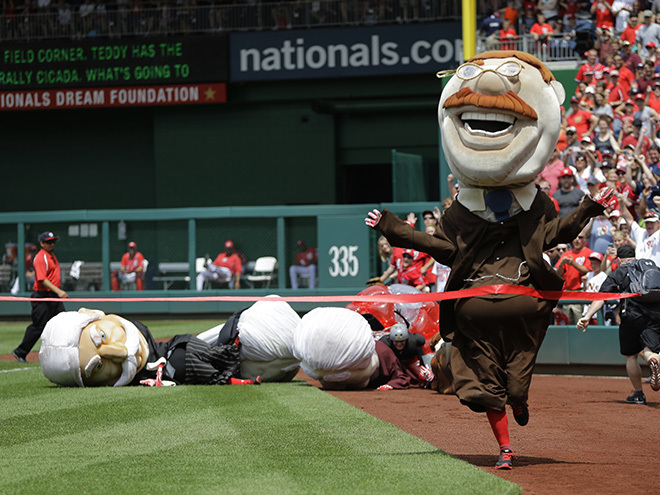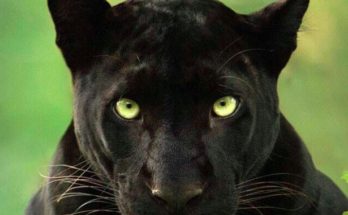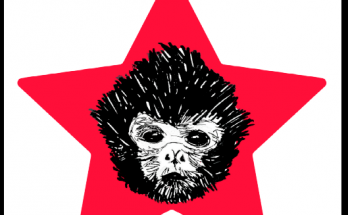In 2012, after the Nats locked up first place in their division, Teddy Roosevelt won his first President’s Race. This never should have happened, and it lead to a devastating loss to the Cardinals in the playoffs. As Mike Tidwell wrote in The Washington Post in 2015, “The Curse of Teddy is real.”
This year, the Nationals won the World Series, breaking the curse after 7 years. Teddy’s curse didn’t last as long as the Curse of the Billy Goat or the Curse of the Bambino, but was still significant.
I fictionalized the moment Teddy Roosevelt won his first president’s race in “Teddy Wins,” a story featured in the short story collection Frida Sex Dreams and first published in D.C.’s Gargoyle Magazine.
Teddy Wins
Melvin’s heart beat quickly as he stepped out of the center field gate and began the race along the warning track, not because of his running pace, which was fairly relaxed, but because of what he planned to do. He peered out of the eye slits and through the neck of the giant foam head he wore and looked up at the crowd. A surprising number of fans, twenty-five thousand, had come out for the Wednesday day game, the last before the playoffs. They cheered with a fever reflective of the team’s unexpected first-place season and chanted the name of the character he portrayed: “TEDDY!” They were brimming over with excitement and poised to see something magical. Melvin would supply it, even if it cost him his job.
Six years of losing. Over 500 carefully scripted defeats. He’d accepted his lot good-naturedly his first year. Even in year two, though slightly dismayed, Melvin understood the role he’d come to play as the loveable loser. But how long did they expect him to sustain the act? The adoration he enjoyed, which the PR folks milked relentlessly, had grown from pity and had built to a crescendo this season with the help of celebrity commentary and witty video vignettes. By now, a fan’s exclamation of “Teddy!” sounded to Melvin like a goading taunt, a reminder of his failures both real and scripted, inside the giant foam head and out.
As planned, Jefferson, Lincoln, and Washington got out to an early lead. Melvin watched their giant heads bob with the strong strides of his colleagues, all of whom, despite their comical costumes, possessed athletic physiques and full, interesting lives.

John, the guy who wore Lincoln, looked like he could put on a uniform and stand next to the athletes in the dugout. He once got the phone number of a beautiful fan while still in costume. Jefferson took the job on a lark after selling his software company at the age of 32, because “What else is there to do?” George Washington’s cell phone rang every two minutes if he forgot to silence it, and he always had someone to meet up with after the game. Melvin, slightly pudgy, balding at age twenty eight, had taken the gig while between jobs, between his own apartment and his parents’ house, between adequacy and total failure. Slowly, he’d come to wonder if these failures weren’t in fact the qualifications the front office had sought out for his role.
Along the right field line, a faux Philly Phanatic appeared from the bullpen and collided with Jefferson and Washington, pushing them to the ground. Then, the green villain threw Lincoln into the dirt as well. The three downed presidents lay there splay-legged, their bodies writhing.
This is where Melvin went off script. He was supposed to take a strong lead, to get tauntingly close to the finish line, only to stop and fix his Usain Bolt-style golden shoe, allowing a last minute Abe Lincoln victory. Instead, Melvin pumped his legs hard knowing that if he got to the red tape finish line quickly, no one would have a chance to obstruct his insubordination. It’d be over before they knew it.
The fans screamed, “TEDDY, TEDDY, TEDDY.” Because Melvin had planned a new path for himself, the refrain took on a genuine tone in his head. It helped propel him past the designated spot for his shoe tying, past six years of carefully orchestrated failure, and through the finish line to the group of Nats-clad PR folks.
The fans erupted into a frenzy, cheering more loudly than at any point during the preceding innings. Melvin threw his hands into the air soaking in his triumph. He ripped off Teddy’s presidential shirt. As far as he could remember, he’d never won anything, not on his own. Today, he’d changed history in the face of the PR department’s careful instructions. Twenty-five-thousand fans applauded his efforts as he pounded his artificially inflated foam chest.
Behind him, Reynolds, one of the president’s’ red-clad wrangler’s said, “Jesus, Melvin. What the hell were you thinking? You know they’ll fire you.” Melvin didn’t respond. Of course, he knew it.
Over the PA system, Clint, the boy-band-looking MC of the ballpark, barked his amazement, but when Melvin looked to where Clint stood by the dugout and meet his eyes, he saw disdain behind his smile. Terrance, the hyper, dread-locked male cheerleader who worked the stands like a derecho, locked his eyes in on Melvin and shook his head slowly. Melvin shifted his attention to the fans who were on their feet now. He spread his arms wide and soaked in their adoration.
Except, when he looked closer, examined them as individuals rather than a cheering mass, he saw the dissenters. One man, an older gentleman with a score book under his arm, scowled. A dad, standing next to his cheering, screaming son, clapped slowly, softly, but his face held the same disdain as Clint’s. Someone yelled, “Why’d you gotta jinx the playoffs, you bum!” Baseball fans are a superstitious lot, and Melvin had expected some backlash. Acceptable fallout.
The cheers died down as the Nats took the field for the bottom of the fourth inning. Reynolds lead Melvin off the field as a fan yelled, “If we lose, it’ll be your fault, Teddy!”
Melvin took it all. The anger, the chiding, the disbelief, the adoration. Teddy, as they knew him, had died. This wasn’t about the team or the front office. This was about Melvin. Empowerment through disobedience, deviation from the script, choosing his own destiny. In his new post-Teddy existence, if he met defeat, it’d be because of his own missteps, and not because of a script, faked injuries, mo-ped mishaps, or Mr. Kool Aid.
“Teddy! Why’d you do it, Teddy?” someone yelled as the cheers died down. Even now on the verge of being fired, Melvin didn’t speak inside his costume, but he wanted to. He wanted to tell him that Teddy’s win, Melvin’s win, marked the end. Good or bad. It was time for something else. Holding on too long is never good. Complacency is poison. It’d almost gotten Melvin, slowly dragging him down as he trotted along the warning track through years of scripted losses. Superstition and tradition never hold up against progress. Melvin hoped those upset now would come to realize that Teddy’s victory had to happen. Strong, willful individuals can shape the future as effectively as a well-run PR department.



